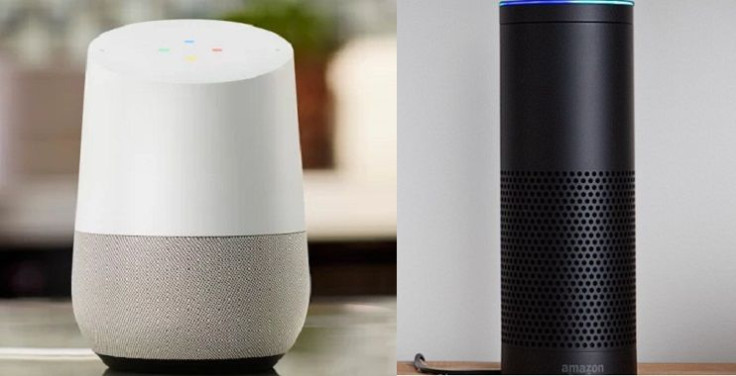Google Home vs Amazon Echo: What's the difference between the AI speakers?
The smart speaker market is set to take-off, we compare the two heavyweights.

Google has announced its very own AI-powered personal assistant speaker, Google Home, to take on Amazon's Echo. Both speakers look to lead the growing market for smart speakers which is estimated to become a multi-billion dollar market as per a Gartner study.
IBTimes UK gives you a lowdown on how the two smart speakers compare.
Design
Although Amazon also offers a cheaper-priced companion product, the Dot, the comparison with Google Home will be made with the Echo, which is the company's signature smart speaker product.
Both speakers have a cylindrical shape. Google Home's design is inspired by wine glasses and candles while Amazon Echo's design is more minimalist and more akin to a Bluetooth speaker but it still carries a futuristic charm. The colour options from Google are more varied as the bottom casing can be swapped out for six different shells (three metal, three fabric) to match your furniture. Amazon only offers two colours for Echo: black and white.
While Amazon's has a physical dial for volume and actual buttons for mute and activation, Google has touch-sensitive panel at the top for you to swipe to control your audio.
Audio
Audio quality is a major feature of the two devices, with both needing to compete with other Bluetooth speakers in the market. Google Home has four, forward-firing speakers inside, while Amazon Echo features one downward-firing unit. Without a UK release date we haven't been able to test the Home's audio, however we have been testing the Echo and are mightily impressed with the clarity and power from the relatively small device. Google only offered a hint that the "integrated high-excursion speaker" will deliver clear highs and rich bass. Amazon Echo has a seven-microphone array for picking up voices, while Google only includes two microphones.
Both speakers have LED lights to indicate when a user is talking and when it's processing a request. Google Cast has more customisation like multi-room audio support, which Amazon Echo doesn't. This means that one can cast their music in different rooms and Home will find the nearest cast-compatible device to play your commanded audio/video. For now, voice casting is limited to YouTube, but Netflix will follow shortly.
AI capability
This is its bread and butter, with the ability for users to talk to the gadgets and get the right answers the most important facet of the smart speaker. While Amazon uses the Alexa virtual assistant, Google Home is loaded with the Google Assistant.
The biggest difference between their AI capabilities is that while Alexa is simpler and can only understand basic commands, Google Assistant has the distinct advantage of being a two-way communicator. The assistant will converse without you continuously and not stop just at one command.
This unique feature is achieved through Google's own natural language processing algorithm where the Assistant is context-aware, so conversation can be more natural and less like computer commands. In addition, Google Home directs its search to Google which is much wider than Bing that Amazon uses for its search commands.
Third-party support
A major judge of functionality of devices these days is how much support it has from third-party apps and utility services. To differentiate this, Google has divided its Home actions under two heads: Direct Actions and Conversational Actions. While direct actions are for straightforward tasks like turning on a light, or playing a song on Spotify, conversational actions are for more complicated requests like booking an Uber, or ordering food where there needs to be a two-way conversation.
Despite Amazon Echo's one way command system, it claims to be able to perform some of these functions that are related to third-party apps. In terms of playing music, Echo can stream from Amazon Prime Music, Spotify and TuneIn radio, while Google will play content from Play Music, Google, Spotify , TuneIn as well as Pandora.
Both speakers are capable of working with Nest, Philips Hue and Samsung SmartThings. But Google has a more definitive ecosystem compared to Amazon. For instance, Nest is a unit of Alphabet which Google acquired for $3.2bn in 2014. Apart from that, Google's service like its search , YouTube and Maps are all well within Google's ecosystem. With the Google Play Store and its Android dominance in the market, the company can tap developers to add support for Home apps.
Pricing
While Amazon original Echo is selling for $179.99 (£150 in the UK), The google Home has been priced much modestly at $129 (UK pricing NA). Although Amazon's Echo range has cheaper versions like Echo Dot and Amazon Tap that cost lesser, Google Home's main competitor will be the main Echo model.
© Copyright IBTimes 2024. All rights reserved.








